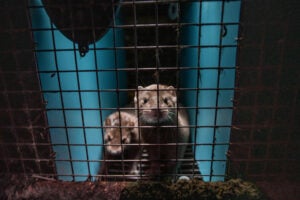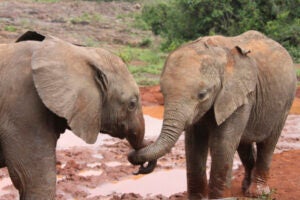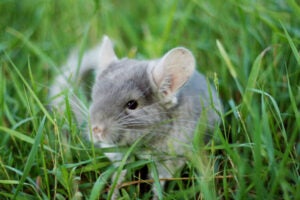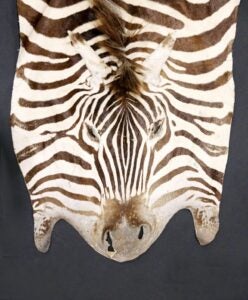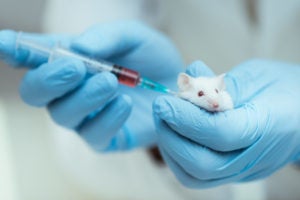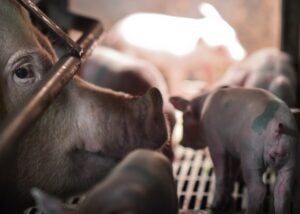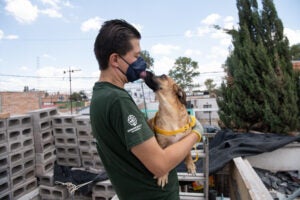WARNING: This content includes graphic descriptions of animals being killed
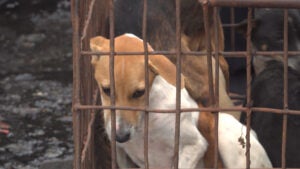
JAKARTA, Indonesia―Indonesia’s notorious Tomohon “Extreme” Market in North Sulawesi province has officially banned the dog and cat meat trade in an historic agreement that will spare thousands of animals from being bludgeoned and blowtorched to death for human consumption. Twenty five dogs and three cats found alive at the slaughterhouses that supplied the market were rescued by Humane Society International as part of the deal, and have been taken to a nearby partner sanctuary to receive emergency veterinary treatment and care until they are ready to find their forever homes.
The last six remaining dog and cat traders signed an historic agreement to permanently close and end all trafficking, slaughter and sale of dogs and cats. The agreement will also disrupt the vast supply network of dog and cat thieves and traffickers involved in the punishingly long-distance transport of these animals that spans the entire island of Sulawesi.
The mayor of Tomohon, Caroll Senduk, also signed into law a ban on all future dog and cat meat trading at the market in recognition of the grave risk of rabies transmission, bringing an end to one of the most shocking and barbaric practices at this notorious market.
The dog meat trade is rampant on the island of Sulawesi, with investigations suggesting more than 130,000 dogs are slaughtered at its markets every year. Tomohon Extreme Market―which sells live and slaughtered dogs and cats alongside butchered pythons, bats and rats―is the most notorious of them all, even listed at one point on tourist websites as a gruesome must-see destination until the listing was removed following protest led by the Dog Meat Free Indonesia coalition. Upsetting footage taken by HSI at the market in March this year, shows dogs cowering and panting in transport cages, then being yanked out by the neck to be bludgeoned to death. Rows of blowtorched dog and cat carcasses are shown on display at market stalls. As a founding member of the Dog Meat Free Indonesia coalition, HSI has been exposing North Sulawesi’s cruel trade for the past six years, including the first ever in-depth exposé in 2017 showing dogs being beaten over the head and blow-torched while still alive.
Lola Webber, HSI’s director of campaigns to end the dog meat trade, said: “With Tomohon Extreme Market going dog and cat meat-free, in addition to the permanent closure of the slaughterhouses that killed hundreds of these animals every week, the impact will be far-reaching, shutting down business for the traders’ vast network of traffickers, dog thieves and slaughterers. North Sulawesi is an epicenter of Indonesia’s cruel and dangerous dog and cat meat trade; the cruelty is obscene and the public health risks from open slaughter and contaminated meat are unparalleled. It is a huge victory for animal welfare and public safety that never again will dogs and cats be bludgeoned and blowtorched at Tomohon market, and we hope this unprecedented agreement will set the standard for other markets and leaders to follow.”
In addition to directly decreasing the supply of dog and cat meat in this hotspot city, HSI hopes this ban will increase pressure on the government to take more seriously the enormous public health risk posed by Indonesia’s dog and cat meat trades nationally. Trans-provincial trafficking of dogs into densely populated cities facilitates the spread of the deadly rabies virus. Studies reveal growing evidence that dog slaughter, butchery and consumption help transmit rabies and expose people, and rabies-positive dogs have been found for sale at markets throughout North Sulawesi, including Tomohon Extreme Market. Rabies is rampant in many parts of Indonesia, endemic in all but eight of its 37 provinces, including all six of Sulawesi’s provinces. Perhaps unsurprisingly North Sulawesi Province has some of the highest rates of human deaths attributed to rabies in Indonesia every year.
Professor Louis Nel, executive director, Global Alliance for Rabies Control, said: “The catching, transport, and killing of dogs for consumption undermines rabies control and elimination plans as it significantly increases the risks of human exposures to infected dogs. The public health threat of rabies can be eliminated by mass dog vaccination programmes, strict dog movement controls and reducing human exposures to infected dogs, all of which are undermined by the illegal dog meat trade.”
Tomohon Extreme Market was officially declared dog and cat meat-free with a banner erected at the entrance of the market and a ceremony at the mayor’s office. Mayor Senduk said: “I am very proud that Tomohon Extreme Market is the first to introduce a ground-breaking agreement between traders and animal welfare campaigners on a dog and cat meat-free declaration. In addition to ending public displays of cruelty, this is an important step in protecting our communities against the threat of rabies and other diseases.”
Elvianus Pongoh, who has traded and slaughtered dogs and cats for meat at the market for over 25 years, agrees that the time has come to end the trade. He said: “I have probably slaughtered thousands of dogs for Tomohon Market over the years. I would try not to think about it too much but every now and then I would see the fear in their eyes or see their tail wag hopefully as I came for them, and it made me feel bad. I know that this ban is best for the animals and also best to protect the public and our families too. If Indonesia is on a path towards banning the trade completely, then we at Tomohon have played a small part in making history.”
The dogs and cats saved by HSI and partner group AFMI are now recovering at AFMI’s nearby sanctuary, the only companion animal sanctuary operating in the province. The severely traumatised and dehydrated dogs and cats received emergency veterinary care on arrival and will have a loving home alongside the sanctuary’s other animal guests until they find their forever homes.
Frank Delano from AFMI said: “We are thrilled to welcome our new companions to our sanctuary where they will never have to fear pain and abuse ever again. With love and patience their physical and mental wounds will heal from the trauma they must have experienced at the hands of the dog meat traders. The trucks packed with hundreds of terrified dogs and cats have driven past our sanctuary on their way to Tomohon Market virtually every day. It was the saddest scene to witness and we are so happy we will never see those trucks again.”
Download video and photos of the last remaining dogs and cats being rescued
Download video and photos of the dog meat trade at Tomohon Extreme Market (May 2023)
ENDS
Media contacts:
- Indonesia: Lola Webber: lwebber@hsi.org +62 813 37408768
- UK: Wendy Higgins: whiggins@hsi.org

